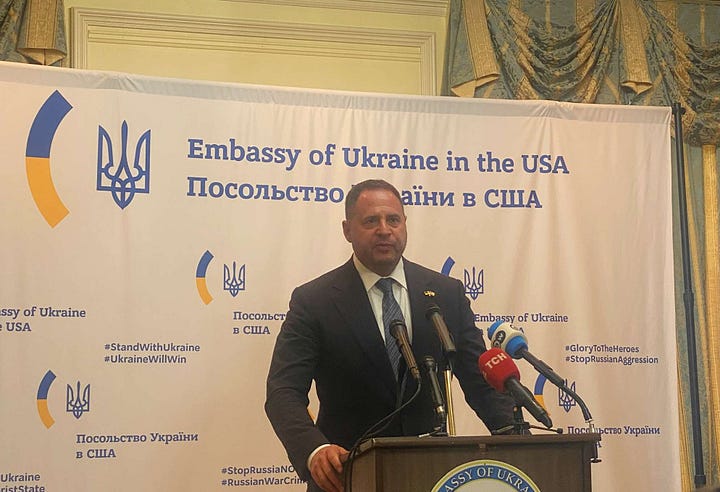There was so much hugely significant news this week (and no, I’m not talking about the Trump-Musk breakup, although that arguably made Twitter funny again) that I’ll keep the preamble short and recommend that you jump right to the weekly news roundup.
Almost every link contains some bombshell story that gets lost in the noise when it’s all thrown together. The Dutch government collapsed. We have new casualty numbers from the Ukraine war. The right-wing won Poland’s election. Israel is arming Palestinian militias in Gaza. The list goes on.
Before you jump into the news, I’ll leave you with some images from the week, of me rolling into Washington D.C. on the Amtrak and waiting for a car in the blistering heat that consumed the city suddenly. There’s one of Ukrainian President Volodymyr Zelensky’s head of office, Andriy Yermak, who appeared in Washington unexpectedly and briefed us on Ukraine’s Operation Spiderweb, which targeted and destroyed 41 Russian aircraft, resulting in $7 billion in losses. There’s a photo of Washington preparing for the annual Pride parade, a matcha latte, and Timothy Garton Ash’s book on Europe. In other words, it’s a snapshot of the week, and what I would probably post on social media if tech bros hadn’t ruined it.





It’s almost my birthday! For the entire month of June, I am offering a significantly discounted rate for anyone who wants to become a paid subscriber of Lazo Letters: $30 annually, or $2.50 per month.
Lazo Magazine also has a Buy Me A Coffee Page, which allows you to make easy, one-off payments. ☕ I accept donations to Lazo in lieu of birthday gifts.
This is yet another plea for your support. I recently commissioned a couple of stories for Lazo Magazine, but I hope to publish even more in the remainder of 2025. Please throw a few dollars our way. Everything goes to the writers.
There are lots of ways to help me grow this tiny, independent editorial project:
• Donate to Lazo
• Read the website and share some of our articles on Facebook, Twitter, and LinkedIn
• Become a paid subscriber of this newsletter
• Share this newsletter far and wide
What I’m writing:
• I spoke to politicians from Europe about what’s at stake in the ongoing trade relations between the U.S. and the European Union. The Trump team has pushed for Europe to relax its regulations on agricultural products and digital services.
• I interviewed Anna Bryłka, a member of the European Parliament from Poland, and a member of the far-right Patriots for Europe group. She’s one of the members of the European Parliament’s Committee on International Trade who is most aligned with Trump.
What I’m reading:
• Conde Nast Traveler has a list of 68 countries offering digital nomad visas, along with instructions on how to apply for them. There are some interesting ones on here.
• Balkan Insight has a deep dive into the Roman victims of Bosnia’s war.
• The number of troop casualties in the Russia-Ukraine war is nearing 1.4 million (1 million Russian and 400,000 Ukrainian), according to a study published by the Center for Strategic and International Studies.
• The Security Service of Ukraine sent drones to attack four military airfields in Russia on Sunday, hitting 41 of Moscow's strategic bombers, Politico Europe reports. Kyiv worked for one and a half years on this plan, which involved smuggling dozens of attack drones deep into Russian territory, where they lay dormant in the floorboards of simple wooden houses, waiting for a signal to attack.
• Ukrainian President Volodymyr Zelensky confirmed that all of the security operatives who participated in the operation that knocked out about $7 billion in Russian military aircraft are safe in Ukraine. The Kyiv Independent has the story.
• The Ukrainian Security Service said it hit the Kerch bridge connecting Russia’s mainland and the occupied Crimean peninsula with underwater explosives, the BBC reports.
• Russian and Ukrainian officials met briefly in Turkey. Peace terms proposed by the Moscow delegation call for Kyiv to give up swathes of its territory not presently controlled by Russia, accept limits on the size of its army, and rule out NATO membership, according to a memorandum reported by Russia’s Interfax news agency. Reuters has the write-up.
• Russian forces are advancing in the northern Ukrainian region of Sumy and are trying to advance on Sumy city, CNN reports.
• U.S. Defense Secretary Pete Hegseth skipped a meeting of the U.S.-created Ukraine Defense Contact Group, which coordinates military aid for Ukraine, the Associated Press reports. It’s the first time the head of the Pentagon has not attended since the group’s creation three years ago.
• Politico’s Europe Playbook reports that the European Union is recommending that EU countries set up so-called “unity hubs” to provide advice and support for Ukrainian refugees who are considering returning home or help them find employment in their host countries. The first hubs are set to open in Germany and Spain.
• The European Union and Ukraine will revert to pre-war tariff quotas on agri-food exports, a blow that will cost Kyiv billions but will largely be taken by Polish farmers as cause for celebration. Euractiv reports.
• Right-wing nationalist Karol Nawrocki was elected Poland’s new president, the BBC reports. Nawrocki won 50.9 percent of the votes, ahead of Warsaw's mayor, Rafal Trzaskowski, who won 49.1 percent.
• Polish Prime Minister Donald Tusk announced he will call a parliamentary vote of confidence in his coalition government after the loss of the government-backed presidential candidate, Rafal Trzaskowski, Reuters reports.
• Brussels formally approved Bulgaria's years-long bid to join the euro area despite major anti-euro protests across the country, Euactiv reports.
• The Slovak parliament approved a resolution calling on the government not to vote in favor of new EU sanctions on Russia, Reuters reports. It’s unclear whether the resolution is binding.
• Dutch Prime Minister Dick Schoof resigned, triggering a new election less than a year into his government, Politico Europe reports. Schoof’s resignation followed the announcement by the far-right lawmaker Geert Wilders that his party would quit the country’s fragile ruling coalition over an immigration policy dispute.
• El País reports that Spain’s Constitutional Court plans to rule that Prime Minister Pedro Sánchez’s move to end legal action against hundreds of Catalan separatists is lawful.
• The United Kingdom is facing an “extraordinary” threat from Russian and Iranian plots, with the hostile states paying local criminals to carry out acts of violence, espionage, and intimidation, a British government adviser told the New York Times.
• In a bid to foster local opposition to Hamas, Israel is arming a small Palestinian militia that controls territory in southern Gaza, the Wall Street Journal reports.
• Turkish prosecutors opened an investigation into Ozgur Ozel, the leader of Turkey's main opposition Republican People's Party, on charges of threatening and insulting Istanbul's chief prosecutor, Reuters reports. The move adds to President Tayyip Erdogan's broad crackdown on the opposition.
• The Trump administration proposed a diplomatic bridge arrangement that would allow Iran to continue enriching uranium at low levels while the United States and other countries work out a more detailed agreement, the New York Times reports.
• The United States reached an “understanding” with Damascus on a plan to “transparently” incorporate thousands of foreign jihadist fighters who fought alongside the Syrian rebels into Syria’s national army, according to Thomas Barrack, the U.S. ambassador to Turkey and Special Envoy to Syria. Reuters has the write-up.
• Mexican voters went to the polls to elect thousands of judges in a far-reaching reform that will transform the judiciary away from an appointment-based system, the New York Times reports.
• Mexico’s ruling Morena party is likely to control the country’s Supreme Court following Mexico’s first-ever judicial election, the Associated Press reports.
• Brazilian President Luiz Inacio Lula da Silva vowed to defend Brazil’s Supreme Court from pressure by the United States, rebuking Secretary of State Marco Rubio’s suggestions that the United States could sanction the judge overseeing the trial of Brazil's ex-president Jair Bolsonaro, Reuters reports.
• South Korea’s new President Lee Jae-Myung pledged to “unite the people” and “never again” allow democratic institutions to be threatened in his inauguration speech, delivered a day after the Democratic Party candidate’s win in the country’s snap election, the BBC reports.
• Cambodia’s National Assembly approved a plan to seek a ruling from the International Court of Justice on the country’s border disputes with Thailand, the Associated Press reports.
You can write to me for any reason: c.maza@protonmail.com




